Place Tectonics: Old and New Montrose Meet in a Pleasant Present

If you’ve lived in Montrose over the past decade, you’ve probably passed a bleak convenience store at the corner of Hawthorne and Stanford. In recent years, the potted plants died. The stock dwindled, the windows grew darker. Then one day the store closed, and a landslide of rubble in its place seemed inevitable.
Neighborhoods, like landscapes, are destined to change. Landmasses collide and mountains emerge; old buildings fall and multi-story mixed-use developments rise in their place. But change doesn’t always mean that the past wholly disappears. Within the earth’s strata, the old can lie next to the new; in neighborhoods, it’s sometimes possible to glimpse the urban version of a geographical cross-section, areas where past and present exist side by side, both still intact. The strip mall at Hawthorne and Stanford that once was home to the convenience store is now one of those core samples
Sheltered by three live oaks, the block houses just two businesses: Mercantile, a six-month old coffee-house that replaced the convenience store and is attentively designed for the new Montrose, and a few steps away Stanford Washateria Laundromat, a 20-year-old, grimy, good-natured institution that was the convenience store’s long-time neighbor and bears the Old Montrose standard.
Mercantile’s customers are professional, partial to fitness, with money to spend on artisanal coffee and tastes that demand beauty in the place where the coffee is sipped. Stanford Washateria caters to students, immigrants, restaurant workers, apartment dwellers, and the down-on-their luck. Above the washateria door hangs a small, blue-framed mirror, a bit of feng-shui from Vietnam.
Different as these two businesses are, the sidewalk in front of Mercantile and Stanford Washateria shares one, distinctly cheerful mood. Maybe it’s the wall of old trees, for now unmolested, that make the commercial space gracious. Certainly, the bright, Amsterdam-style townhouses across the street give both places a shared, lovely view. Or maybe clean laundry and fresh coffee just have a salutary effect. Whatever the reason, at this one moment in geological time, in this one sliver of space, Montrose in flux is a strikingly pleasant place.
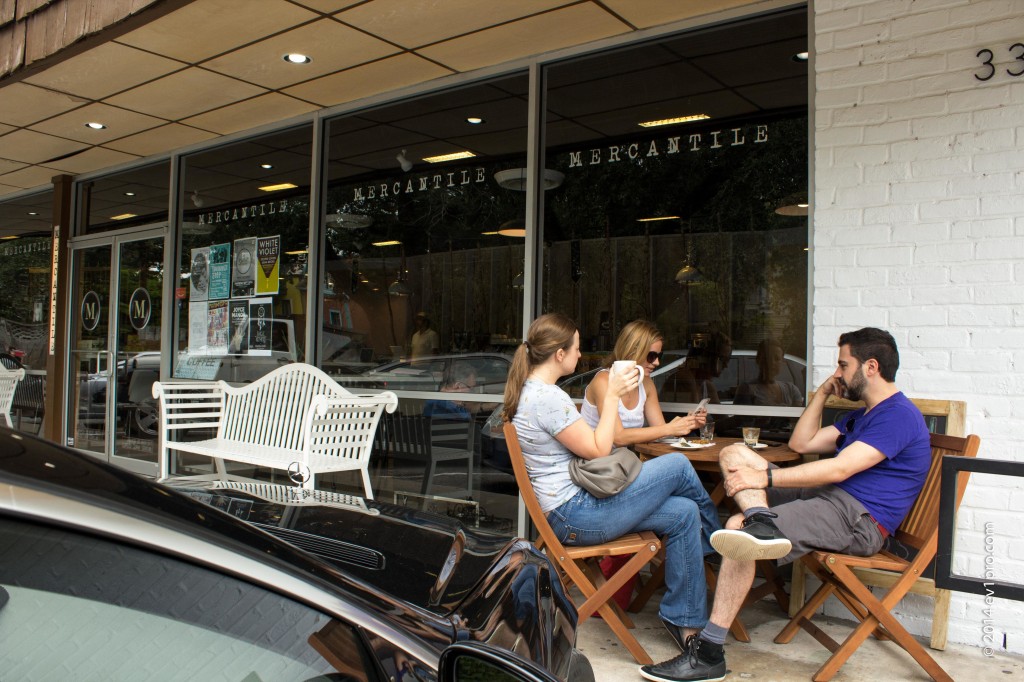
Mercantile is meant to appeal equally to college students and businesspeople, dog walkers and yoga students, language enthusiasts from the nearby Alliance Française, and dreadlocked cyclists clutching literary paperbacks. In other words, as barista Brian Peter Jr. says, “We want the neighborhood.”
The decor actively courts all these personalities. Clean and gently industrial, Mercantile displays a sparse selection of items that at first seem mysterious: all-natural cleaning liquid, expensive organic pop-tarts, “Curiosity Cola” alongside the requisite Odwalla juices and water. The connection? All items are locally produced, Peter explains.
What clients really come for, of course, is coffee. And space. Mercantile clearly has put work into brewing its ambience: a row of slender tree trunks lines the back wall, art magazines and cookbooks are on loan near the door, and behind a white picket fence in a corner stands a huge picnic table, meant for community working. It is packed with young men frowning into their laptops, coffee cups long ago pushed aside.
Then there are the swings: a pair of genuine, board-and-rope articles slung high from the ceiling. They’re not a gimmick. Although one swing hangs alarmingly near a huge wine rack, Mercantile employees don’t even look up when a pair of unsupervised little girls scramble on, propel themselves into the air with their legs, then lapse into dreamy drifting.
“That’s what they’re there for,” Peters shrugs. “I had my job interview on one.”
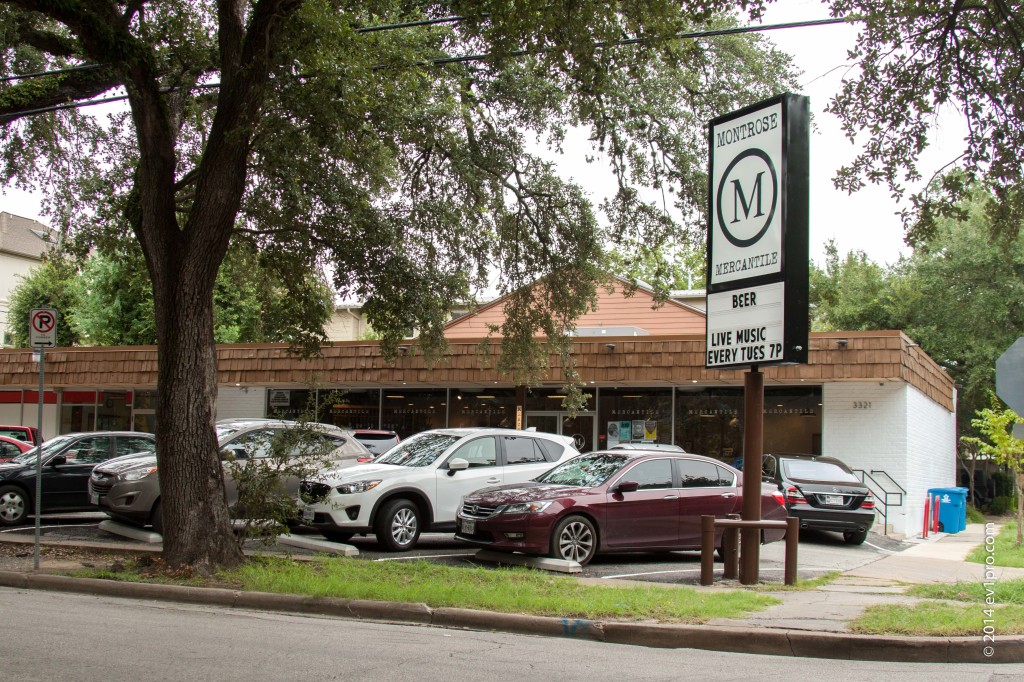
On a recent Saturday, customers relax outside on white metal benches straight out of Southern Living. Others perch cups of coffee on teak cafe tables with matching chairs. On the pavement is a wrought iron stand containing two dog bowls freshly filled with water. Like the swings, the dog bowls aren’t for show: at almost any hour of the day, someone is out front with a dog, often a lovingly groomed purebred with excellent manners.
At one of the teak tables, a young man and woman in their 20s leap up to hug two friends: a gym-muscled man and his partner. Attention quickly turns to the man and woman’s dog, a German Shepherd. “We bought him from a breeder in Seattle,” the young man says. “I’d wanted him for years.”
On the other side of the dog bowls a young couple chatting in French follows a tiny girl in a persimmon cardigan. They moved to Houston just a few months ago from France, the man explains later in English, to work in the oil and gas industry.
They knew they needed to live somewhere centrally located between their two jobs, he says. But they also wanted a neighborhood that was beautiful. And one in which they could walk, where there were things to look at it. In the end they chose Montrose because it reminded them of Europe.
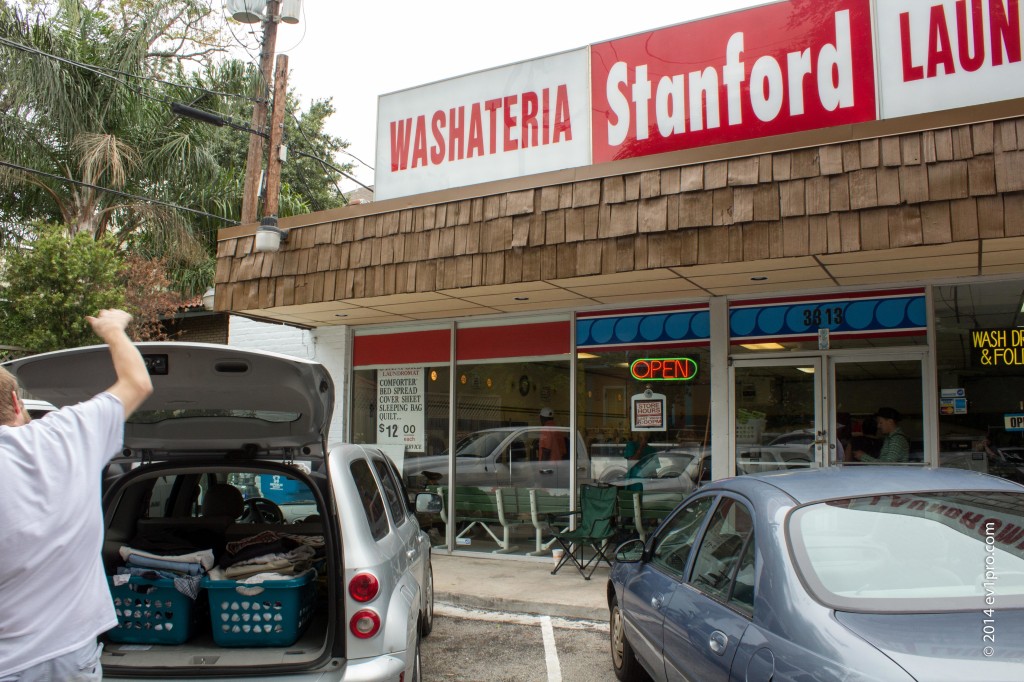
At Stanford Washateria Laundromat the customers are outside, too. Leaning against the wall near a potted oleander, or sitting in folding chairs pulled from car trunks, they chat and make each other laugh while waiting for their clothes.
Behind a plate glass window the washing machines toil. Grimy white and bolted to the floor, they churn through the wash cycles for $1.50 a load. Along the wall, a bank of metal dryers finishes the job. Behind a second plate glass window to the right, one can see the workings of the laundromat part of the business – piles of clothes heaped in carts, a little desk with notebook and papers, and a half-eaten Vietnamese lunch of a roll, a slice of pate, some salad.
A middle-aged black woman, wearing a long black gown of yoga material and a cobalt-blue head wrap, hauls a family laundry basket through the door. A skinny young white man dumps his clothes into a machine, then settles on a plastic bench to watch football on a high screen.
Some customers have spent Saturdays here for the last 20 years. On the sidewalk, a burly, handsome man waits for his clothes. He looks at home. His name is Fred Brown, and although he has a house in Fresno, he comes to Montrose on the weekends to do his laundry. “I grew up in the Fourth Ward,” Brown says. “I’ve been gone since I went to college, got married, and then divorced. But I like this area. I like to eat around here. There’s not much left of the Fourth Ward. It looks good, though. ”
Brown has other reasons to come here. The laundromat’s freelance handyman, who keeps a green folding chair parked on the sidewalk, is a childhood buddy. Brown likes to check in on him. And he likes to see the laundromat’s owner, Duc Gha Nguyen.
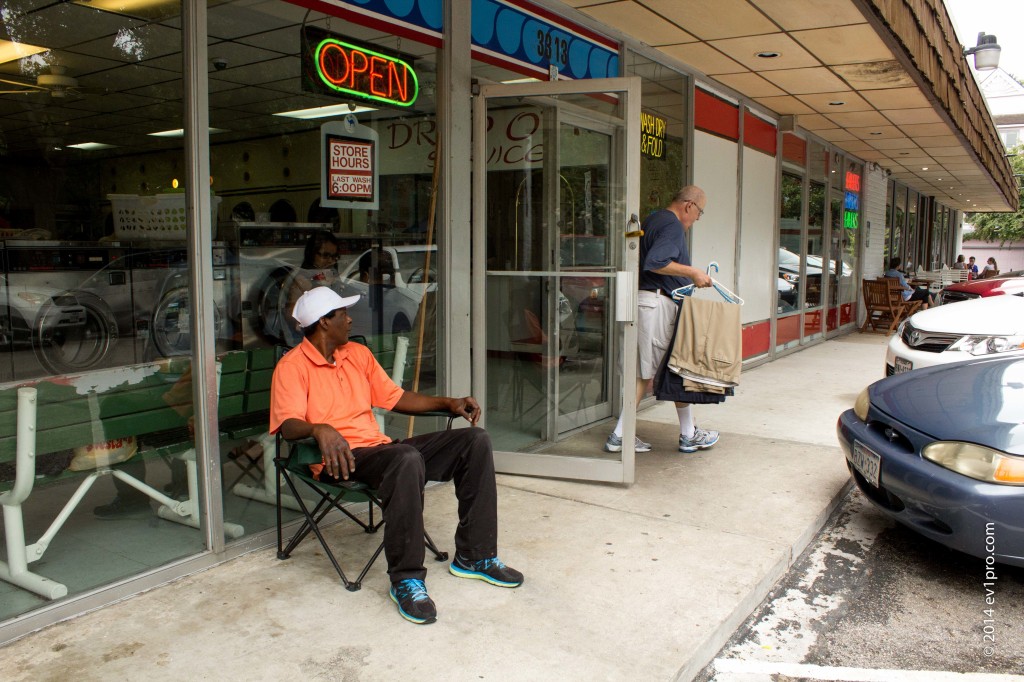
“He’s a friend,” Brown says, pulling a heap of warm clothes from a dryer. At that moment, Nguyen appears. In black jeans, black t-shirt, and black baseball hat, with wisps of long henna-brown hair, Duc Gha Nguyen is impossible to categorize. He looks like a cross between Iggy Pop and someone’s great-uncle from Vietnam.
“Don’t believe him,” Nguyen says. “Don’t believe a word!”
Doesn’t he like his clients?
“I’ve lived long enough to hate them,” Nguyen says. “And they hate me.”
Brown cracks up.
A foot taller than Nguyen, Brown inclines toward him affectionately. Nguyen leans slightly toward him. They remain like this for a moment. The posture is unconscious, wholly relaxed, like that of brothers.
But Nguyen will brook no love for this place. “I’m a dead man walking! Do you know how old I am?” he demands. “I am 74. I spend $1.25 to make one dollar. I work 14 hours a day. No vacation, no sick leave. I pay a thousand dollars on water each month. I have a friend who says, “Show me how to run a laundromat. But I say, ‘Don’t do it! The more you stay here, the more you get into debt.’ I can’t sell it. No one will buy it.”
The laundromat is just successful enough, though, to pay the bills. So Nguyen stays, teases his customers, and studies the surrounding neighborhood. The regulars remain much the same. “They are the working people,” Nguyen says. “Students, too. They wait for three months to do their wash, and then they have to come here to do it all at once.”
But affluent neighbors bring him business as well. “This guy, this guy,” – Nguyen points – “I know where they all live. They have washing machines at home. They bring in their dog mats to wash in my washers and we have to hand-clean [the washers] with Clorox. I’ve researched it. There are about 7,000 people in this area. And 15,000 pets. I hate them.”
Brown smiles indulgently, folding a shirt.
“Don’t write any of this!” Nguyen says, darting off. A few minutes later, though, he can be seen back among his machines, saying something over the roar that is making Brown laugh.
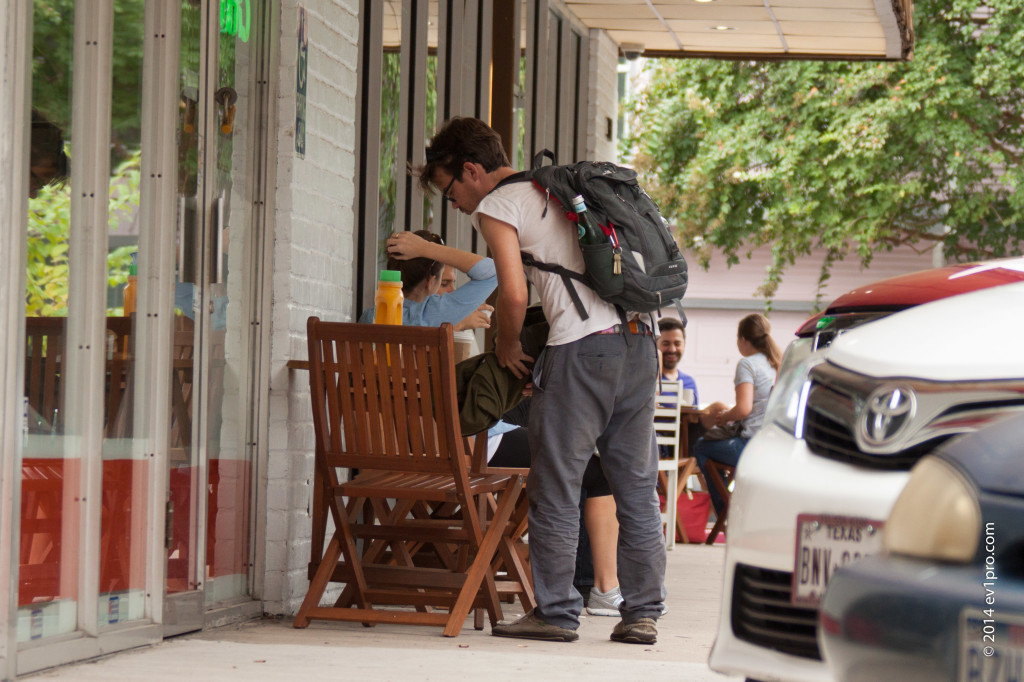
How long will Nguyen’s laundry endure? Longer than he wants it to, perhaps. “I can’t afford to leave if I want to,” he complains. “It costs a hundred dollars an hour to get someone to unbolt the machines from the floor.”
His neighbors at the old convenience store had it easier: when the rent became overwhelming, Nguyen claims, “They just ran away. They packed up and they left from one day to the next.”
But Brian Peter, the barista next door, has heard another, less catastrophic version of how the mall’s landscape changed. It’s part of Peter’s job to learn the area: faces, coffee preferences, back stories. He knows clients sometimes buy coffee while doing laundry at Nguyen’s place. In fact, Peter says, Mercantile would be open to building loyalty for both establishments with free coffee for laundromat customers.
“I can’t verify this story,” Peter adds during a late-morning lull. “But around the time the convenience store was closing, a friend of mine went in to buy a bottle of water. There were boxes everywhere, but there were still things on the shelves. And the owner said, ‘I’m sorry, I can’t sell you anything right now. I won the lottery.’ ” Peter’s friend looked askance to see if this was a joke. But, Peter says, “Another man, who was doing some kind of bookkeeping, looked up and told my friend, ‘It’s true. He just won the lottery.’ ”
Perhaps it’s a myth; Montrose has mines full of them. But in the hundred years of its existence, the ground in Montrose has shifted radically more than once. Maybe, at least for a time at Stanford and Hawthorne, the latest tectonic shift could give rise to something stable.

As long as the laundromat closes, i don’t care. I love that place.